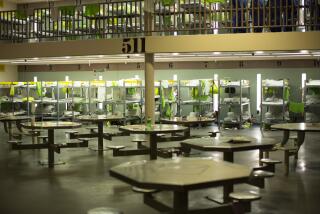Ex-Trooper Found Guilty in Theft of Impounded Cocaine
- Share via
A former California Highway Patrol officer was convicted Wednesday of taking part in what authorities described as the largest theft of drugs from any law enforcement agency in the state.
George Michael Ruelas, 43, faces a possible life prison term for his role in the disappearance of nearly 650 pounds of cocaine from an evidence locker at the state Bureau of Narcotic Enforcement in Riverside over the Fourth of July holiday weekend in 1997.
After deliberating less than two hours, a Los Angeles federal court jury found Ruelas guilty of conspiracy and possession of narcotics intended for distribution. U.S. District Judge Christina A. Snyder set sentencing for Aug. 26.
Ruelas, a 13-year CHP veteran, was one of three rogue law enforcement officers who staged a fake burglary at the narcotic bureau office and then peddled the drugs through a Manhattan Beach dealer, according to prosecutors.
The other officers were Ruelas’ half brother, Richard Wayne Parker, 47, a veteran narcotics agent assigned to the Riverside office; and Michael Wilcox, 42, Ruelas’ former CHP partner.
Assistant U.S. Attys. Beverly Reid O’Connell and Lisabeth Rhodes said the three netted about $1.8 million from the cache.
Parker was convicted of the cocaine theft in 1999. He is serving a life prison term. Wilcox was later indicted on charges of structuring cash bank deposits to avoid federal reporting requirements. Under questioning, he implicated himself and Ruelas in the theft.
Parker, he said, came up with the idea to steal the cocaine while the office was closed over the holiday. Wilcox said he served as a lookout as Ruelas entered the evidence vault, using a key and an access code provided by Parker.
Wilcox said Ruelas left behind a mechanical door spreader and a set of alligator clips attached to the alarm box to make it look as if the office had been burglarized.
Because Parker was expected to come under scrutiny, it was decided that he would stay away that night so he could establish an alibi, according to Wilcox.
After loading several duffel bags filled with cocaine into his sport utility vehicle, Wilcox said, he drove to his home near Fresno. Periodically over the next year, he said, Ruelas would drive there to pick up consignments of cocaine intended for sale in the Southern California area.
In a bid for leniency, Wilcox agreed to wear a concealed recording device and met with Ruelas before Thanksgiving in 1999 at an East L.A. restaurant. Portions of the tape were played for the jury.
Though Ruelas never directly admitted taking part in the heist, his comments proved damaging.
“I always made sure you got yours,” he told Wilcox, an apparent reference to an agreement to split the proceeds, O’Connell told the jury. Wilcox, the prosecution’s star witness, testified that he received about $600,000 from drug sales handled by Parker.
Taking the stand in his defense, Ruelas said he was driving to Tucson on the night of July 4, 1997, when prosecutors say the locker was raided. He said he left California about 3 p.m. and arrived in Tucson about 10:30 p.m. at his mother-in-law’s home.
To back up his account, defense lawyers introduced a billing statement showing that Ruelas’ credit card was used to buy gas in Tucson on July 4, 1997. Prosecutors countered with records showing that the Ruelas credit card was used in Tucson at 10:58 that morning, when, by all accounts, he was still in California.
Ruelas’ defense team was caught off guard by the disclosure.
More to Read
Sign up for Essential California
The most important California stories and recommendations in your inbox every morning.
You may occasionally receive promotional content from the Los Angeles Times.













